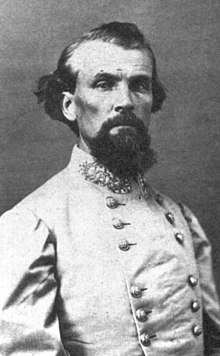Nathan B. Forrest
| Nathan Bedford Forrest | |
|---|---|
 |
|
| Nickname(s) | Old Bed – Devil Forrest Wizard of the Saddle |
| Born |
July 13, 1821 Chapel Hill, Tennessee |
| Died | October 29, 1877 (aged 56) Memphis, Tennessee |
| Buried at | Health Sciences Park Memphis |
| Allegiance |
|
| Service/branch |
|
| Years of service | 1861–1865 |
| Rank |
|
| Unit | White's Company, TN Mounted Rifles |
| Commands held | 3rd Tennessee Cavalry Forrest's Cavalry Brigade Forrest's Cavalry Division Forrest's Cavalry Corps |
| Battles/wars | |
| Relations |
|
Nathan Bedford Forrest (July 13, 1821 – October 29, 1877), called Bedford Forrest in his lifetime, was a lieutenant general in the Confederate Army during the American Civil War. He is remembered as a self-educated, innovative, and courageous cavalry leader during the war and as a leading Southern advocate in the postwar years. He was a pledged delegate from Tennessee to the New York Democratic national convention of 4 July 1868. Forrest was an early member of the Ku Klux Klan (KKK). Historian and Forrest biographer Brian Steel Wills writes, "While there is no doubt that Forrest joined the Klan, there is some question as to whether he actually was the Grand Wizard of the Ku Klux Klan."
A cavalry and military commander in the war, Forrest is one of the war's most unusual figures. Although less educated than many of his fellow officers, before the war Forrest had already amassed a fortune as a planter, real estate investor, and slave trader. He was one of the few officers in either army to enlist as a private and be promoted to general officer and corps commander during the war. Although Forrest lacked formal military education, he had a gift for leadership, strategy and tactics. He created and established new doctrines for mobile forces, earning the nickname The Wizard of the Saddle.
Forrest was accused of war crimes at the Battle of Fort Pillow for allowing forces under his command to massacre hundreds of black Union Army and white Southern Unionist prisoners. Union Major General William T. Sherman investigated the allegations and did not charge Forrest with any improprieties.
...
Wikipedia
